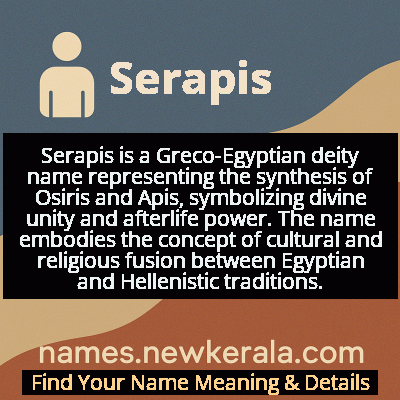Serapis Name Meaning & Details
Origin, Popularity, Numerology Analysis & Name Meaning of Serapis
Discover the origin, meaning, and cultural significance of the name SERAPIS. Delve into its historical roots and explore the lasting impact it has had on communities and traditions.
Name
Serapis
Gender
Male
Origin
Egyptian
Lucky Number
6
Meaning of the Name - Serapis
Serapis is a Greco-Egyptian deity name representing the synthesis of Osiris and Apis, symbolizing divine unity and afterlife power. The name embodies the concept of cultural and religious fusion between Egyptian and Hellenistic traditions.
Serapis - Complete Numerology Analysis
Your Numerology Number
Based on Pythagorean Numerology System
Ruling Planet
Venus
Positive Nature
Harmonious, responsible, caring, and artistic.
Negative Traits
Overly idealistic, superficial, possessive, or jealous.
Lucky Colours
Pink, turquoise.
Lucky Days
Friday.
Lucky Stones
Diamond, turquoise.
Harmony Numbers
2, 3, 9.
Best Suited Professions
Artists, musicians, teachers, healthcare workers.
What People Like About You
Warmth, nurturing nature, artistic flair.
Famous People Named Serapis
Serapis Bey
Spiritual Master
Ascended Master in Theosophy and Ascended Master Teachings
Serapis Christian
Religious Leader
Early Christian figure who syncretized Serapis worship with Christian theology
Temple of Serapis Priest
High Priest
Oversaw the famous Serapeum of Alexandria religious center
Name Variations & International Equivalents
Click on blue names to explore their detailed meanings. Gray names with will be available soon.
Cultural & Historical Significance
The cult of Serapis spread throughout the Mediterranean world, with major temples (Serapeums) in Alexandria, Memphis, and eventually Rome. The Alexandria Serapeum became one of the ancient world's great libraries and learning centers. Serapis worship continued into the Roman era until the temple's destruction by Christian mobs in 391 CE, marking a significant moment in the transition from paganism to Christianity. The deity's imagery often showed him as a bearded man wearing a modius (grain measure) on his head, symbolizing fertility and abundance.
Extended Personality Analysis
Individuals named Serapis are often perceived as having a synthesizing intelligence, able to bridge different perspectives and create harmony from apparent contradictions. They tend to be spiritually inclined with a deep interest in metaphysical matters, often serving as mediators or bridge-builders between conflicting groups. Their natural authority and calm demeanor can make them effective leaders who inspire loyalty and respect.
These individuals typically possess a strong sense of tradition combined with innovative thinking, allowing them to honor the past while moving forward. They often exhibit patience, wisdom beyond their years, and a capacity for deep contemplation. Their connection to the name's historical roots may give them an appreciation for ancient knowledge, cultural exchange, and the transformative power of synthesis in both personal and professional contexts.
Modern Usage & Popularity
The name Serapis remains extremely rare in modern times, primarily used by scholars, historians, and individuals with specific interest in Egyptian or classical history. It occasionally appears in esoteric or spiritual communities that draw from ancient traditions. The name has never ranked in baby name databases, making it a truly unique choice. Its usage is almost exclusively masculine and typically limited to contexts where its historical and religious significance is appreciated rather than as a common given name.
Symbolic & Spiritual Meanings
Serapis symbolizes the power of cultural synthesis and religious syncretism, representing how different traditions can merge to create something new and powerful. The deity embodies themes of resurrection and eternal life through its connection to Osiris, while also representing earthly abundance and fertility through the Apis bull association. Symbolically, Serapis stands for wisdom that transcends cultural boundaries, the unification of opposing forces, and the transformative power that emerges when different worldviews converge in meaningful dialogue.

